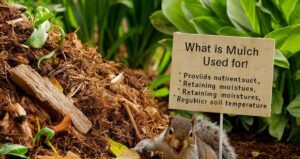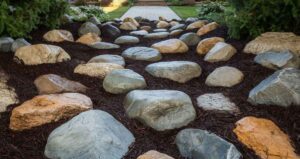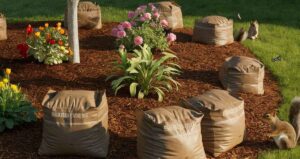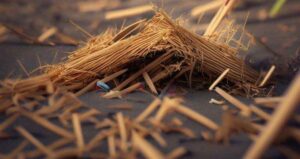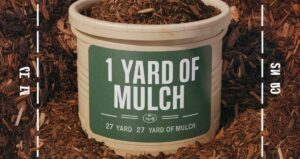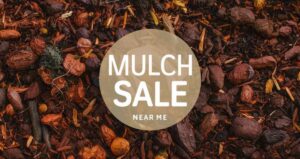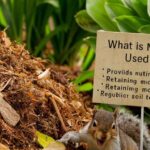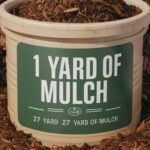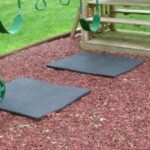Oak leaves make excellent mulch for vegetable gardens, providing organic matter, suppressing weeds, and enhancing soil structure. Their gradual decomposition enriches the soil with nutrients, fostering a healthier garden ecosystem.
Embark on a journey to discover the garden magic within oak leaves! Are Oak Leaves Mulch For Vegetable Gardens? From weed suppression to nutrient-rich soil, delve into the world where oak leaves transform into the perfect allies for a flourishing vegetable garden.
Indeed, oak leaf mulch proves to be excellent mulch for vegetable gardens. Their natural decomposition enriches the soil with nutrients, fostering a thriving ecosystem. Oak mulch also helps suppress weeds, conserves soil moisture, and enhances soil structure, creating an optimal environment for your vegetable plants to flourish and yield a bountiful harvest.
Unique Table Mulch For Vegetable Garden?
Delve into the realm of sustainable gardening with oak leaves as mulch. Discover the benefits of this natural resource in nurturing your vegetable garden, from soil enrichment to weed suppression.
| Benefits of Oak Leaf Mulch |
| Nutrient-rich soil |
| Effective weed suppression |
| Soil moisture conservation |
| Enhanced soil structure |
Explore the unique advantages oak leaves bring to your vegetable garden, fostering a healthier and more productive growing environment.
Understanding Oak Leaves as Mulch
Oak leaves, with their unique composition, offer several advantages when used as mulch in a vegetable garden. These benefits include nutrient enrichment, weed suppression, soil moisture conservation, and enhanced soil structure.
Nutrient-Rich Soil Enhancement
One of the key benefits of using oak leaves as mulch is their contribution to nutrient-rich soil. As these leaves decompose, they release essential minerals and organic matter into the soil, creating a fertile environment for vegetable plants.
Table Nutrient Content in Decomposing Oak Leaves
| Nutrient | Contribution |
| Nitrogen | High |
| Phosphorus | Moderate |
| Potassium | Significant |
| Organic Matter | Abundant |
This decomposition process not only provides vital nutrients for plant growth but also improves soil structure over time.
Effective Weed Suppression
Oak leaves create a natural barrier that helps suppress weed growth in the vegetable garden. The layer of mulch prevents weed seeds from receiving sufficient sunlight, inhibiting their germination and growth. This not only reduces the competition for resources but also minimizes the need for constant weeding, saving time and effort for the gardener.
Soil Moisture Conservation
Maintaining optimal soil moisture is crucial for the health of vegetable plants. Oak leaves act as a protective layer, reducing evaporation and conserving soil moisture. This is beneficial during hot and dry periods when moisture retention becomes a challenge. Consistent moisture levels contribute to healthier plants, better yields, and less water dependency.
Enhanced Soil Structure
In addition to nutrient enrichment and weed suppression, oak leaves contribute to improved soil structure. As the leaves decompose, they create a loose and friable texture, enhancing aeration and root penetration. This is advantageous for vegetables with shallow root systems, promoting healthier root development and overall plant growth.
Considerations for Using Oak Leaves as Mulch
While oak leaves offer numerous benefits, there are considerations to keep in mind for successful mulching in a vegetable garden.

Leaf Shredding
To accelerate decomposition and prevent matting, consider shredding oak leaves before applying them as mulch. Shredding increases the surface area, allowing for quicker breakdown and nutrient release.
Mulch Depth
Maintain a consistent mulch depth of 2 to 4 inches around vegetable plants. Avoid piling the mulch against the plant stems, as this can create a conducive environment for pests and diseases.
Seasonal Adjustments
Be mindful of seasonal changes. While oak leaves provide insulation during colder months, adjust mulch thickness in warmer seasons to prevent excessive heat retention around plant roots.
Is oak leaf safe?
In general, oak leaves are safe and pose no harm to humans. It’s important to note that some oak species contain tannins, which can make the leaves bitter and toxic in large quantities. While animals like deer and insects may consume oak leaves without issue, humans are not likely to consume them in significant amounts due to their unpalatable taste.
If oak leaves have been treated with pesticides or chemicals, they may not be safe for consumption. It’s always advisable to avoid using leaves from trees that have been subjected to chemical treatments.
If you’re considering using oak leaves for mulch or other purposes, it’s recommended to gather them from healthy, untreated trees and to avoid ingesting them directly. When used as mulch in a garden, oak leaves contribute positively to soil health and plant growth.
What kind of mulch do you put in a vegetable garden?
Several types of mulch work well in a vegetable garden, offering various benefits. Here are some common and effective types of mulch for vegetable gardens:
Straw or Hay
Straw or hay is a popular organic mulch. It helps retain soil moisture, suppresses weeds, and adds organic matter as it breaks down. Ensure it’s free of weed seeds.
Wood Chips or Shredded Bark
These materials are pleasing and effective in moisture retention and weed control. Wood mulches also contribute to soil structure improvement as they decompose.
Grass Clippings
If free of herbicides, grass clippings make an excellent mulch option. They provide nitrogen as they break down and help retain moisture.
Leaves
Shredded or whole leaves from deciduous trees make an excellent mulch. They contribute to soil fertility as they decompose and provide insulation.
Compost
Well-aged compost can be used as mulch. It not only helps with moisture retention and weed suppression but also enriches the soil with nutrients.
Newspaper or Cardboard
When layered properly, newspaper or cardboard can suppress weeds. These materials also break down over time, contributing to the organic content of the soil.
Pine Straw
Pine straw is a good option for acid-loving plants. It’s lightweight, allows for good water penetration, and breaks down slowly.
Plastic or Landscape Fabric
While not organic, plastic or landscape fabric can be used for weed control. Ensure proper water penetration by creating holes in the material.
When choosing mulch for your vegetable garden, consider factors such as availability, cost, aesthetics, and the specific needs of your plants. Ensure that the mulch is applied properly, maintaining an appropriate depth and avoiding contact with the plant stems.
What are the uses of oak leaves?
Oak leaves find myriad uses – ideal mulch for gardens, enriching soil, and suppressing weeds. Composting with oak leaves enhances nutrient-rich soil. In crafts, they bring fall-themed décor to life.
Traditional medicine recognizes its astringent qualities for skin applications. Oak leaves mulch insulate garden beds during winter, provide natural dyes, and even serve as bedding for certain animals. Their versatility extends beyond the tree, contributing to sustainable practices and diverse applications in gardening, crafts, and traditional knowledge.
FAQ,s
Why choose oak leaves for mulching?
Oak leaves enrich the soil with nutrients, providing a natural and sustainable way to boost your vegetable garden’s health.
Do oak leaves prevent weed growth?
Oak leaves act as an effective mulch, suppressing weeds and reducing the need for constant maintenance.
How do oak leaves benefit soil moisture?
Oak leaves help conserve soil moisture, creating a balanced environment for vegetable plants to thrive.
Are oak leaves suitable for all vegetables?
Yes, oak leaves make versatile mulch, benefiting a variety of vegetables by enhancing soil structure and supporting overall plant health.
conclusion
choosing oak leaves as mulch for your vegetable garden is a wise and sustainable decision. Their nutrient-rich decomposition enhances soil vitality, while effective weed suppression and moisture conservation create an optimal environment for vegetable plants to flourish.
Embracing oak leaves as mulch not only nurtures your garden but also exemplifies a natural and eco-friendly approach to gardening. As you witness the benefits unfold – from healthier soil structure to a thriving vegetable yield – it becomes clear that oak leaves stand as not just good but exceptional mulch for cultivating a bountiful and sustainable vegetable garden.


